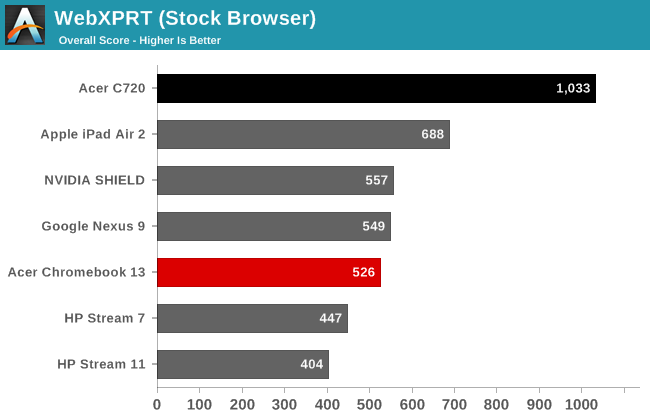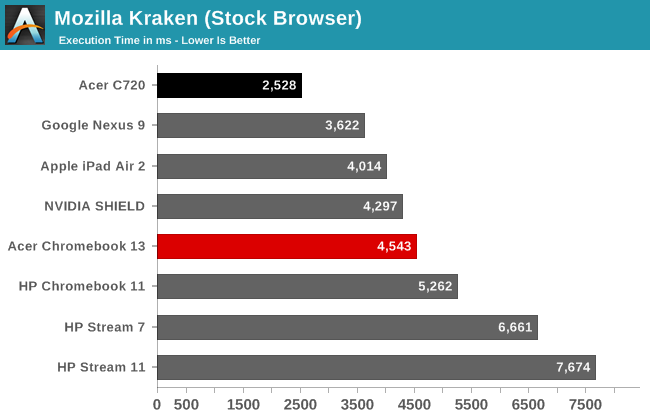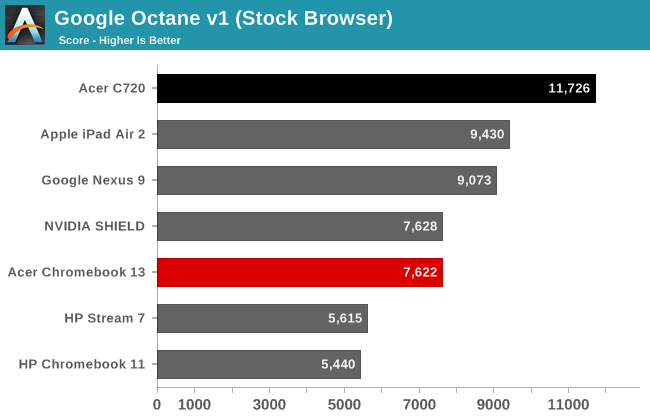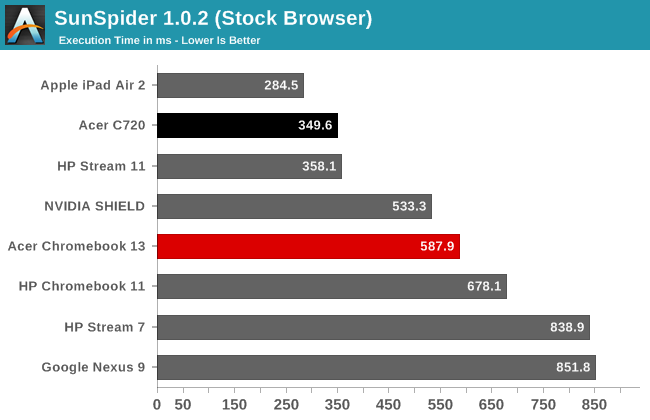Acer Chromebook 13: 1080p with Tegra K1
by Jarred Walton on January 23, 2015 10:00 AM ESTAcer Chromebook 13 Performance
I commented on the previous page that performance can at times feel lacking with the Chromebook 13. I think a large part of that comes from the NVIDIA Tegra K1 SoC, unfortunately. I’ve used an NVIDIA SHIELD, and going from an 8-inch tablet to a 13.3-inch laptop you’d think maybe they could push performance a bit more, but in most cases it’s a wash. Being a Chromebook (laptop), however, most sites will default to a heavier non-mobile view that can take a bit longer to fully process and display, and interactions with the laptop during this time can be very sluggish.
Benchmarks alone don’t necessarily convey the complete performance experience, so let me preface this section by saying that the older C720 was clearly more responsive in certain workloads. If you’ve never used the C720 then the Chromebook 13 won’t necessarily feel too slow, but switching between the two – or running tests simultaneously on both laptops – shows that while TK1 is more power friendly, the Haswell Celeron ends up being faster in nearly every computational workload. Even graphics doesn’t generally favor TK1, though the difference in screen resolution certainly plays a role as the C720 was only available with a 1366x768 panel.
For our performance testing of Chromebooks, we end up using a lot of tests that we run on tablets as there aren’t many Chromebook benchmarks. Also keep in mind that some of our Chromebook results are quite old (relatively speaking), so while we are running the latest build of Chrome OS on the C720 and CB13, the other Chromebooks were tested more than a year ago. We also aren’t able to test the older models on newer benchmarks, so some of our charts only have a few results. With that out of the way, here’s a quick look at performance.




| Additional Performance Results | ||
| Acer C720 | Acer CB13 | |
| CrXPRT | 96 | 55 |
| CrXPRT Battery (Hours) | 8.52 | 9.9 |
| OORT Online (WebGL) | 3270 | 4010 |
| Spacerocks (WebGL - FPS) | 18 | 30 |
| WiFi FTP Download (Mbps) | 100 | 115 |
And there’s the rub: no matter how much NVIDIA might like to say otherwise, when it comes to competing with Intel’s Core architecture there’s still a huge performance gap on the CPU side of the fence. If we were talking about a 10-20% difference, you could say I’m splitting hairs, but the C720 is well over 50% faster in all the non-graphics workloads, and in a few cases it’s close to twice as fast. Given we’re not even talking about particularly speedy processors to begin with – the Celeron 2955U is literally Intel’s “slowest” Haswell processor – a 50-100% improvement in performance is something you will notice.
Just typing in Google Docs – or heaven forbid, Microsoft’s Office 365 Word online, which can feel a bit like a pig even on a fast desktop PC – the experience can be anywhere from a bit laggy on the Chromebook 13 to downright slow. Open up a long Reddit page or other complex website and again performance starts to matter. I’m enough of a power user to appreciate added performance, even on a budget Chromebook, and the upcoming Chromebook 15 will certainly be interesting to look at.
Also of interest is the WiFi performance testing. Using my 3x3 802.11ac router and a 5GHz connection for both Chromebooks (though the C720 is only 802.11n), the two Chromebooks end up delivering pretty similar WiFi results. The Chromebook 13 is technically faster with its 1x1 802.11ac adapter, but while that should in theory allow well over 200Mbps of real-world throughput, in testing it topped out at 115Mbps. The C720 on the other hand manages 100Mbps; I'm not sure if it has a 2x2 or 1x1 802.11n adapter, but the net result is a relatively small difference in throughput.
With all this talk of performance, it’s important to take a step back again and ask the question: what are you going to do on your Chromebook? For every task that I might run that can push the performance limitations a bit, there are plenty of options where a Chromebook works fine. Both the C720 and the CB13 handled 1080p YouTube videos without a problem, and if you want to store an MP4 video locally they also handle that fine. For everyday Gmail (or other web mail) and Internet surfing, the Chromebook 13 is definitely good enough. And again, the keyboard just has a good feel to it, so as I write this review I may at times want to switch to my desktop, but that’s only because I prefer the desktop version of Word to Google Docs, not because of the typing experience.










71 Comments
View All Comments
lefty2 - Friday, January 23, 2015 - link
Beware, Haswell and Broadwell Chromebooks are being subsidised by Intel, but the subsidy is only tempory. As soon as Intel corners the market the subsidy will disappear and they will be replaced with cheaper Bay Trail chips:http://techtainian.com/news/2014/6/1/intel-is-subs...
is a strategy by Intel to make
JarredWalton - Friday, January 23, 2015 - link
Intel subsidizes a lot of things by offering chips at discounted prices. You'll note that the article talks about Haswell Celeron chips being subsidized by Intel, and yet here we are with a Broadwell Chromebook six months after that article was written. And yes, a lot of Chromebooks in the meantime used Bay Trail.Celerons are used in other laptops besides Chromebooks, but where the limited RAM and other cut corners are a problem on Windows that's not generally the case with Chrome OS. Intel may have dropped the price of the Celeron chips $50 to get into things like the C720, but as I've just shown with the benchmarks, C720 at $249 (i.e. unsubsidized) would hardly be a bad option.
Long term, we'll have to see what's available and the pricing -- and we still don't have a clear idea how much the 1080p IPS Chromebook 15 from Acer will cost. But if they can get that out at $299, it's guaranteed to win a ton of awards. At $349, it ends up more like the Toshiba Chromebook 2: lovely display, but $349 for a Chromebook is getting to be a bit high in pricing.
errorr - Sunday, January 25, 2015 - link
of course what you suggest is illegal as well...
savagemike - Friday, January 23, 2015 - link
Doesn't Toshiba offer a 13 model with an IPS display? I think it only has a baytrail though.One great thing about ChromeOS you didn't mention was the upgrade paradigm/procedure. It takes literally 10 seconds or so to upgrade my Chromebook. Compared to the hours of my life I've spent tapping my fingers and waiting for Windows to cycle through installing updates it's a breath of very fresh air.
I would actually say a Chromebook does 100% of what 'most' people want. I think you'd only have to look at some simple numbers to see that 'most' Windows computer users aren't in fact running Photoshop or high end games or anything like that. And the Windows machines available at these same prices would not be a good choice for those activities at any rate.
Most computer users are surfing the web, doing some e-mail and facebook and that's about it.
I see a lot of comments about needing Windows to do 'real work'. This usually referring to MS Office I suppose. A lot of businesses run using Google Docs though. And I'm sure their work is just as 'real' to them. So I don't really get such notions. You can do plenty of 'real work' on a Chromebook, depending on what your work is. There certainly isn't anything stopping you from doing school work or running a business or writing the great American novel on one.
I'm interested to see what Google does with ChromeOS going forward. Frankly I think the answer lies in the massive uptake of containerization going on in the Linux community.
It would be very easy for Google to take advantage of the wide range of powerful Linux apps while still maintaining the high security and ease-of-use of Chromebooks if they implemented some type of Docker type container mechanism into the heart of it.
JarredWalton - Friday, January 23, 2015 - link
Yes, I mentioned the Toshiba CB2 with 1080p IPS a couple times. As for the "100% of what most people want"... no, I don't believe that at all. It's 100% of what some people do, sure, but even my non-techie wife ran into limitations pretty quickly when I had her use a Chromebook. Some of it was due to differences in how you use the laptop (where are my files kind of stuff), and she could live with the platform if necessary, but there are lots of small things that can get missed. Maybe it's 99% of what most people need, but that 1% can still be too much if it's an important item (e.g. a bank site that doesn't work properly with Chrome, though that's rare these days).savagemike - Friday, January 23, 2015 - link
Use certainly depends on ... well... use. But of the handful of friends and family I help out with computer stuff most only need to know anything about the file system ever to download and install applications. Typically a browser or virus program or flash plugin installer and the like. Most of that stuff goes away with ChromeOS. For the little that's left I don't find using the file system any worse than explaining how to use a traditional file system to them.But yes, certain people will have certain needs or uses which either wouldn't work or would require learning a new routine.
AmdInside - Sunday, January 25, 2015 - link
Agreed. When patch Tuesday is here and I see an update to .Net I cringe cause those are the slowest updates, even with Windows installed on an SSD.harrynsally - Friday, January 23, 2015 - link
I'm not digging Chromebook's power / functionality / utility.I just purchased a Dell laptop with 15.6" touch screen, Intel Haswell core i3, 4GB RAM, 500GB HDD, DVD, HDMI, USB 3.0 & 2 x USB 2.0, 6 cell battery etc. for $299. For less than $100 replaced the HDD with a Samsung 250 GB 850 EVO SSD,
OK, it came with Win 8.1 OS. I've been using Windows since it first came out (e.g. 3.1, 95, XP, 7) and have yet to have a malware issue. I set it up to boot to desktop mode (e.g. have a Android tablet for touch apps) and find the Win 8.1 experience comparable to Win 7 and sometimes better. Additionally, MS just announced that they will provide a free upgrade to Win 10 (to users of Win 7 and 8.1).
I find the ability to easily choose/ add upgraded components, run applications and have productivity independent of the cloud, USB / HDMI connectivity and much higher performance for just a few $ more, a no brainer.
On a budget? My daughter just purchased a ASUS laptop with 15.6" screen, Intel 2.16GHz N2830, 4GB RAM, 500GB HDD, HDMI, USB 3.0 & USB 2.0 and Win 8.1 BING for $219.
JarredWalton - Friday, January 23, 2015 - link
I don't know when the last time is I actually got hit by malware/virus on one of my PCs. But I have friends and family I help who are not as savvy that get malware ALL. THE. TIME. It's crazy to me -- like a person will have a system for less than two weeks, and it has malware (that happened with my dad just this past month). I'd blame porn sites for some users, but that's not even the problem on some of these systems. It's looking for "free [anything]" and going to the wrong web sites, or searching for a web site in Bing instead of typing in the URL (that's what got my dad I'm pretty sure).I'd love to say the solution is user education, but that just doesn't work. Get yourself a bunch of friends or relatives with children 8+ years old who are allowed to use the PC on a daily basis and I guarantee some of them will get hit with malware within a month. I tend to fix at least 20 computers a year where the only problem is that they got hit by malware. Thankfully, most of them aren't as bad as Cryptowall, which wiped out my dad's desktop and is asking for a $2000 ransom. (And that was with Norton AV running.)
BackInAction - Friday, January 23, 2015 - link
@JarredWalton: I hear you loud and clear! My father gets stuff on his machine within days after I clean it. I dread going home. I just can't protect him enough from his stupid habits. In his case, I think is 'gun' sites. And randomly clicking on anything that pop-ups up in his face.While my kids were young it wasn't much of a problem. Now that they are older it is crazy ("gee I can get free music, or the latest episodes of Teen Ware-wolf before it is on Netflix, from this site, all I have to do is download this .exe." Doh!). I had to remove their admin rights. It is a bit of pain now and then, but it was the only way I could keep sane.
That said, I have a Chromebook (13" Toshiba for $180 last fall) and they all fight for it. I don't care what they do on that thing. I can wipe and rebuild it in 15 min if needed.